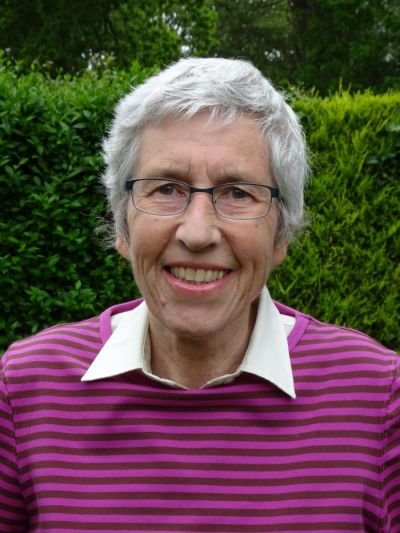
Christine Greenland
Monday 11th June 2018
Christine Greenland aged 71, had never been in hospital before and didn’t know that anything was wrong with her heart. Six years ago, after a heart murmur was picked up during a visit to a gastroenterologist, she was eventually referred to a cardiologist where she was diagnosed with a mitral valve prolapse. Only four months prior, Christine’s twin sister Katharine had been through a similar experience!
Christine, a retired library manager, lives a quiet and active life in Norfolk along with her twin sister Katharine and their dog. She keeps herself busy out in her garden and enjoys getting out for walks to explore the countryside, loves a game of carpet bowls and never says no to a good quiz. Christine has always been in good health, however six years ago at the age of 65 she was surprised by a diagnosis of heart valve disease.
After a visit to a gastroenterologist, she was told that they had detected a heart murmur and was sent for an echocardiogram. (The echo came back inconclusive) The gastroenterologist couldn’t interpret the echo, but after speaking to her GP, she was eventually referred to a cardiologist who told her she had a mitral valve prolapse, a form of valve disease. She was prescribed medication to help the ventricle enlarge but was told that treatment would eventually be needed.
Shortly after her diagnosis, Christine began to notice some breathlessness when bending in her garden and discomfort when lying flat during sleep. Eventually she found she was unable to stay out in the garden for as long as she used to and thought it may be to do with the ageing process. However, Christine had been told by her cardiologist that her valve would ‘go’ in stages and she was soon referred for a mitral valve repair.
Christine received her mitral valve repair via minimally invasive keyhole surgery at Basildon University Hospital by Cardiac Surgeon Inderpaul Birdi. The surgery went well and Christine was in the hospital for less than a week during her recovery. She was surprised how many people were there to test and monitor her and as she was progressing well and managing to exercise on her own she felt she didn’t need the local rehabilitation course offered to her. Recovery wasn’t all smooth sailing though and she did have some discomfort and tiredness, but after a short while she was back to feeling like herself again.
“I was lucky to have the support of my twin sister who had been through exactly the same procedure just four months before me,” said Christine. “I found the whole experience interesting and less daunting than I’d imagined, never having been in hospital before. I believe that without the treatment I would have deteriorated fairly quickly.”
Inderpaul Birdi said “Minimally invasive surgery involves a much shorter stay in hospital versus the traditional surgical treatment meaning the patient can expect a stay of only four to five days. The surgery also involves reduced discomfort, lower risk of infection and less scarring post procedure due to the small access points so recovery is much quicker as there are less life limitations involved post surgery.” Christine’s life is now more or less back to normal and she feels it was well worth the time for recovery to get back to where she is now. And where is that? Back in her garden of course, enjoying her time with her sister and getting out for walks with their dog.
Glad to hear you’re doing so well Christine!


